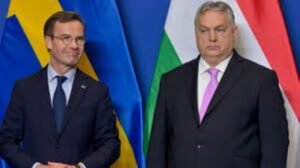On February 26, the last obstacle in Sweden’s path to join NATO was removed with Hungary’s acceptance. With this choice, Sweden came to an end to a two-century period that had been defined by its military neutrality and self-reliance, which had helped to build its reputation as a worldwide peacekeeper and human rights defender.

Sweden’s consideration of joining NATO was prompted by Russia’s invasion of Ukraine in February 2022. The country had to make a crucial decision: either join NATO or risk becoming alone in the face of a more aggressive neighbour while acting alone. Some Swedes, however, expressed alarm about this action since they saw it as a perceived identity shift.
Sweden- A Legacy of Neutrality
The head of the Swedish Peace and Arbitration Society, Kerstin Bergea, voiced concern, pointing out that the country’s long-standing commitment to peace and disarmament may be eroding with NATO membership. Because its history of neutrality is so engrained in its national character, Sweden is able to have a considerable amount of influence on the international scene. As seen by Olof Palme’s condemnation of U.S. activities in Vietnam, the country’s neutrality permitted its open censure of Western policies and its mediation in conflicts, from Dag Hammarskjold’s peace efforts in the Congo in the 1960s to Hans Blix’s work as chief U.N. weapons inspector during the Iraq war.
Veteran diplomat Jan Eliasson emphasised the significance of Sweden’s neutrality in his attempts at mediation, highlighting the nation’s standing as a moral powerhouse. But the country’s historical stance faces issues when it joins NATO. Critics worry that it would limit Sweden’s independence and force it to align with NATO partners; this is demonstrated by changes in the country’s approach to Turkey and worries about nuclear disarmament.
Sweden’s neutrality has always been a compromise between principle and practicality, having developed in response to previous wars. In spite of its neutral stance, the country participated in clandestine collaboration with the US during the Cold War and has been progressively aligning with NATO in the aftermath of geopolitical upheavals and reduced military prowess following the fall of the Soviet Union.
Public Sentiment and Regional Realities
Sweden’s growing support for joining NATO also indicates a shifting of sentiments, particularly in light of regional dynamics and the aggression shown by surrounding nations. The necessity for a stronger defence posture and the Finnish example have shaped public opinion.
Sweden’s choice to become a member of NATO signifies a dramatic shift from its long-standing neutrality and the beginning of a new phase in its security strategy. Although this action assures security, it also calls into question Sweden’s future diplomatic strategy and its historical role as a neutral peacemaker.











Comments 1